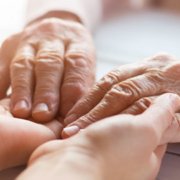8 Things Every Senior Living Associate Needs to Know About Dementia Care
Whether you’re a CEO, business office manager, or housekeeper, you need to know eight things about caring for residents with Alzheimer’s disease and related dementias (ADRD).
- Memory Loss is Not a Normal Part of Aging. That’s right, just because you get older does not necessarily mean you will have memory loss. Memory abilities do change with normal aging to some extent, but they are much more affected by the changes in the brain that happen with illnesses such as Alzheimer’s disease and related dementias.
- Alzheimer’s disease is a Physical Disease Process. Many people misinterpret some of the behaviors seen by individuals with ADRD as a form of mental illness or acting out. I have even heard Alzheimer’s residents described as being manipulative and intentionally disruptive. Our brains are responsible for controlling everything we do throughout the day including mobility, motor function, hunger, thirst, feelings, thinking, and emotion. Alzheimer’s disease leads to nerve cell and tissue loss throughout the brain. Over time, the brain shrinks dramatically. We wouldn’t ask someone with a broken arm to lift a large, heavy box – but often times we will ask those with ADRD: “What did you have for dinner?”
- Every Resident Goes Through the Disease Process Differently. We all have different perspectives, experiences, interests, and personalities. Even though the disease affects certain areas of the brain, each individual can experience different symptoms, reactions, and behaviors. As a wonderful mentor once told me, “If you’ve met one person with Alzheimer’s disease, you’ve met one person with Alzheimer’s disease.”
- Negatives only Produce Negatives. Because ADRD impacts areas of the brain that control judgement, reasoning, perception, and sequencing, individuals with ADRD can often act in an unsafe manner. For example, wanting to go outside in a winter storm without a coat or shoes. But saying “no,” “stop,” or “don’t” will only aggravate the situation. Reasoning may not always be a practical approach.
- Knowing the Resident is Key in Providing Quality Care. The more we know about the resident—their likes and dislikes, their history, their life story—the easier it is to provide them with moments of joy and success as well as better outcomes in managing challenging behaviors.
- Great Care Starts with Being Resident-Focused versus Task-Focused. The goal for each day should not be to check off a list of duties. Success should not be measured by showers, meal intake, or med reminders. A successful day for a resident is the opportunity to have choice, be successful, be loved and respected, and experience joy.
- Choice and Control are Key. Providing residents with opportunities for choice and control allows resident to feel good about themselves. This helps decrease the level of frustration. Oftentimes, caregivers will place a specific drink at a resident’s table setting knowing they like orange juice at breakfast. But allowing a resident to choose their morning drink, or depending on their level of functioning, to say “yes” to a glass of orange juice gives them choice and control in an environment where they have very little of those.
- You Can’t Take Great Care of Residents if You are Not Taking Great Care of Yourself. Working with individuals with ADRD takes a lot of patience, calm demeanor, humor, and did I mention patience? It can be a difficult role at times. It’s important to care for yourself and recognize when you are getting impatient and frustrated.


